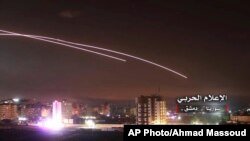Israel has been conducting military operations against Iran on Syrian soil for more than two years.
Many missions have been shrouded in secrecy, but this week the Israelis offered rare confirmation of an airstrike on an Iranian weapons cache located near Damascus' international airport.
And Israel's outgoing military chief, General Gadi Eisenkot, went into greater public detail about the conflict before handing off to his successor, General Aviv Kochavi, a 54-year-old former paratrooper.
With Syria's long-running civil war winding down and Israel determined to thwart Iran from entrenching militarily near its borders, the unusual admission about the air raid last Sunday and the readiness of Eisenkot to discuss how Israel has been striking at Iran inside Syria highlights the risks of escalation, say analysts.
Eisenkot, who retired Tuesday after 40 years of service in the Israeli Defense Force, told Britain's Sunday Times, "In January 2017 we began attacking the infrastructure the Iranians were building in Syria. The critical mass was from mid-2017. We began attacking systematically a number of times each week. Without making any statements. Beneath the radar."
Both Israel and Iran, Russia's partner in propping up the government of Syria's President Bashar al-Assad, are maneuvering as they draw up their strategies to secure their national interests for dealing with post-civil war Syria. Israel's Institute for National Security Studies, an influential research institute with Tel Aviv University, argued this week in its annual assessment that "Israel needs to prepare for the possibility that its battle to keep Iran from entrenching itself militarily in Syria may have to be expanded to Lebanon or to Iran directly."
"Most of the fronts facing Israel are very volatile: Syria, Lebanon and the Gaza Strip. In all three, despite the existence of mutual deterrence between the sides, there is a potential for escalation toward a broad confrontation and a general war, more than one front at a time," the institute said.
According to the institute's report, which was released at the official residence of Israel's prime minister, the most serious threat facing Israel would be an all-out war in the north that would include Iran, Hezbollah and Syria.
"Such a confrontation would also likely spill over to the south, and Israel would additionally find itself battling terrorist organizations from the Gaza Strip," it warned.
Israel's strikes against Iran inside Syria began around 2013, when Israel bombed convoys carrying Iranian weapons to its ally Hezbollah, the Lebanese Shi'ite militia which fought a bloody war with Israel in 2006. Eisenkot acknowledged that Israel had also supplied some anti-Assad rebel groups with small arms, something long suspected but not confirmed by Israeli officials.
Russia's role
The airstrikes since 2017 have directly targeted Iranian bases. One air raid in May was mounted on the day Israeli Prime Minister Benjamin Netanyahu was in Moscow to visit Russian leader Vladimir Putin, a trip designed to gain from the Kremlin a promise to try to restrain Iran from establishing permanent bases in Syria.
Putin agreed to try to ensure that Iranian forces would stay at least 15 kilometers away from Israel's border with Syria. His foreign minister, Sergei Lavrov, publicly announced that "only representatives of the Syrian Arab Republic's army should stand at Syria's border with Syria."
Most analysts say the Kremlin, which has done much to woo Israel, has limited influence on Tehran and that Russia's balancing act among Israel, Assad and Iran is likely to test even Putin's diplomatic agility. In September, Russia ignored longstanding Israeli objections and announced the delivery of S-300 surface-to-air missiles to Syria.
Israel's intentions
In the meantime, Netanyahu's public confirmation of last Sunday's airstrikes near the Damascus international airport and Eisenkot's outlining of operations are clear indications that Israel has no intention of letting up.
Eisenkot said Israel has "carried out thousands of attacks without taking responsibility and without asking for credit." He said Israel dropped 2,000 bombs on Iranian targets inside Syria in 2018 alone. Missile strikes have also been launched and he acknowledged some special forces ground operations have been conducted.
Israeli officials say they hope Syria's Assad may want to restrain the Iranians, too, once he has consolidated his grip on the country, even though Iran will seek strategic returns for its backing of him. Regardless of what Assad does, Netanyahu emphasized at a Cabinet meeting this week that Israel would continue with airstrikes as long as an Iranian presence remains in Syria.
That drew a chorus of public threats from Iranian military commanders, including from Mohammad Ali Jafari, head of the Islamic Revolutionary Guard Corps, who warned, "Know that you are playing with the tail of the lion. Fear the day Iran's precision missiles land on your head."











